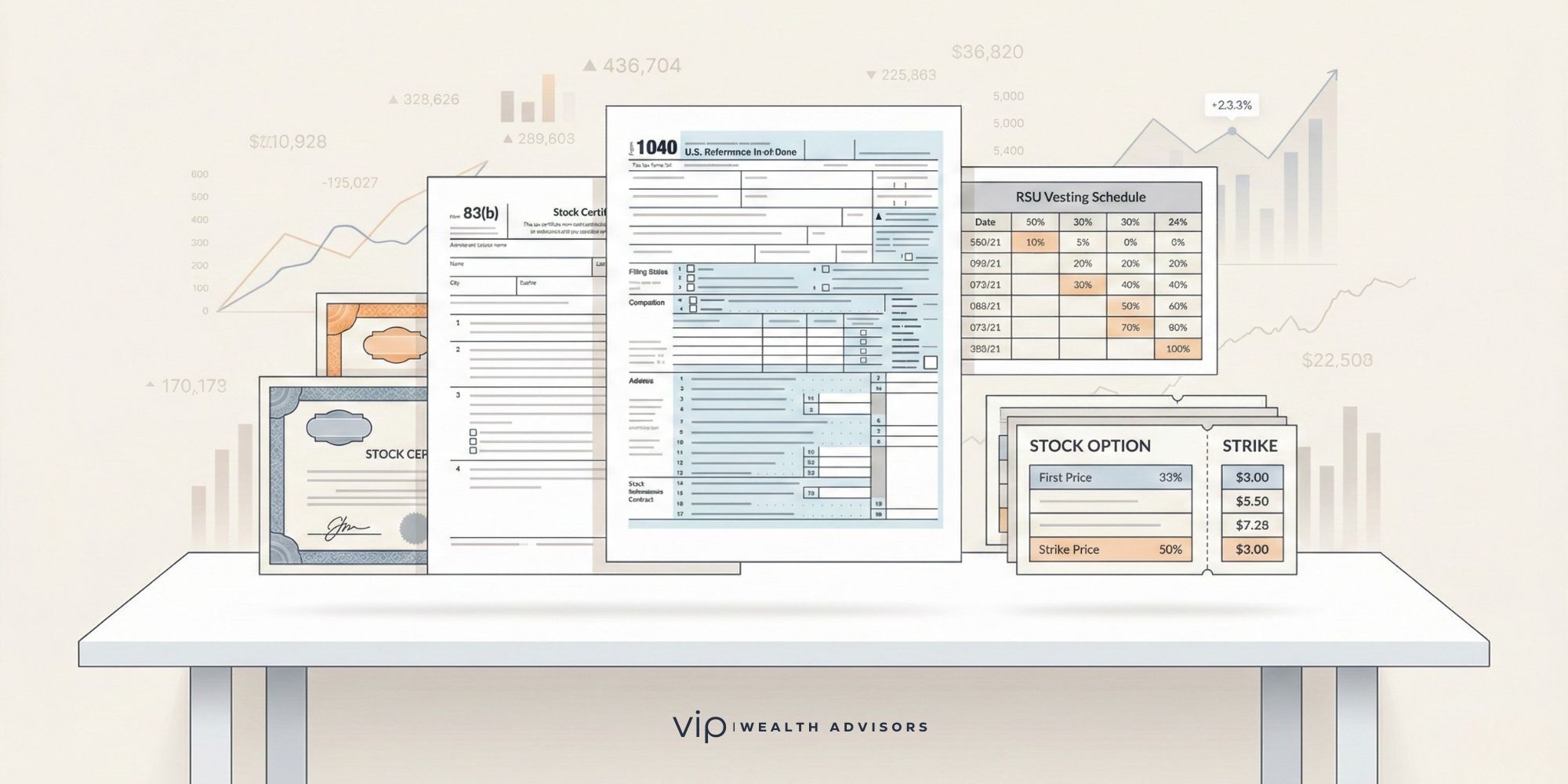1031s, 721s, and QOZs: Which Is Right for You?
If you're sitting on significant capital gains from rental properties, stock options, or the sale of a business, you're probably looking for ways to reduce or defer the tax hit. Fortunately, the tax code offers three powerful tools to achieve this: the 1031 Exchange, the 721 Exchange, and Qualified Opportunity Zone (QOZ) investments.
Each strategy has its own rules, timelines, and ideal use cases. In this article, we'll walk through how they work, who they're best for, and how to compare them.
What Is a 1031 Exchange?
A 1031 Exchange, named after Section 1031 of the Internal Revenue Code, lets real estate investors defer capital gains tax when selling one investment property and purchasing another. As long as the exchange follows IRS rules, you won't owe taxes on the gain at the time of sale.
This strategy is a favorite among real estate investors who want to keep their money compounding in new properties rather than handing over a chunk to the IRS.
Example: Let's say you bought a duplex in 2015 for $500,000. In 2025, you sell it for $1.2 million. If you cash out, you could owe over $200,000 in taxes, depending on your depreciation, state tax, and other factors.
But if you reinvest the entire $1.2 million into a new property using a 1031 Exchange, you defer the tax and keep the full amount working for you in a new asset.
Using a 1031 Exchange to Invest in DSTs
A Delaware Statutory Trust (DST) is a passive real estate investment structure that qualifies as like-kind property under Section 1031. This means you can use a 1031 to invest in a DST instead of buying a physical building yourself.
DSTs often own large, institutional-grade properties, such as medical buildings, multifamily complexes, or logistics centers, and are managed by professional sponsors. You own a fractional interest but have no landlord responsibilities.
Benefits of a DST in a 1031 Exchange:
- No active management - ideal for landlords who are ready to retire from hands-on property ownership
- Easier identification - DSTs are pre-packaged and often available for quick closing
- Portfolio diversification - many DSTs include multiple properties across different regions and asset classes
- Potential gateway to a 721 Exchange - more on that below
What Is a 721 Exchange?
A 721 Exchange, also known as a UPREIT transaction, enables investors to contribute property to a Real Estate Investment Trust (REIT) in exchange for operating partnership (OP) units. Those OP units can later convert to REIT shares, which may eventually be sold for cash.
Here's where it gets interesting: if you complete a 1031 into a DST, and that DST is later rolled into a REIT via a 721 Exchange, you've effectively swapped your real estate for REIT shares - without triggering immediate tax.
Step-by-Step: 1031 to 721 via DST
- Sell your property
- Complete a 1031 Exchange into a DST
- The DST sponsor contributes the trust's properties to a REIT
- You receive OP units in the REIT's operating partnership
- Later, you may convert your OP units into publicly traded REIT shares
Key Considerations:
- Once you complete a 721 Exchange, you cannot do another 1031 with those assets
- 721s are best for investors who want to transition out of direct real estate ownership
- Liquidity is a future benefit - your REIT shares may be sold, but you'll eventually pay capital gains tax
1031 vs. 721: What’s the Difference?
| Feature | 1031 Exchange | 721 Exchange |
|---|---|---|
| Goal | Defer tax and stay in real estate | Defer tax and exit into REIT |
| Management | Active or passive (via DST) | Fully passive |
| Liquidity | Illiquid (must sell again) | REIT shares may be sold in the future |
| Future 1031 eligibility | Yes | No |
| Best for | Growth-minded real estate investors | Retiring landlords seeking income & liquidity |
Qualified Opportunity Zones (QOZs): A Different Kind of Deferral
While 1031s and 721s focus on real estate, QOZs apply to a much broader range of capital gains, from the sale of stocks, businesses, crypto, or real estate.
QOZs were created as part of the Tax Cuts and Jobs Act of 2017 to spur investment in underserved communities. To invest, you roll your capital gain into a Qualified Opportunity Fund (QOF) within 180 days of the sale.
Key Tax Benefits of QOZs:
- Tax deferral until the end of 2026
- Tax-free growth if held for at least 10 years
- Gains from nearly any source can qualify
Example: You sell $3 million of company stock in 2025, generating a $2 million gain. You invest the gain into a QOF in August 2025. That gain becomes taxable in 2026, but if the QOF grows to $5 million by 2035, the $3 million of appreciation is tax-free.
Comparing 1031, 721, and QOZ Strategies
| Feature | 1031 Exchange | 721 Exchange | QOZ Investment |
|---|---|---|---|
| Defers capital gains? | Yes | Yes (via 1031) | Yes (until 2026) |
| Requires real estate? | Yes | Yes (via DST) | No |
| Passive ownership option? | Yes (via DST) | Yes (REIT) | Yes (QOF investment) |
| Liquidity? | Low | Medium (via REIT) | Low to medium |
| Long-term tax-free growth? | No | No | Yes (after 10 years) |
| Best for... | Real estate pros | Retiring landlords | Investors w/ large gains from any source |
Which Strategy Is Right for You?
Here’s how to think about which of these options might make sense for your situation:
- Use a 1031 Exchange if you want to keep growing your real estate portfolio and avoid paying tax with each property sale
- Use a 1031 into a DST + 721 Exchange if you're ready to step away from property management and transition into REIT ownership
- Use a QOZ investment if you've sold highly appreciated stock, crypto, or a business and want a path to tax-free growth in a long-term, passive vehicle
Of course, it’s not always either/or. Some investors layer these strategies together across multiple assets and timelines.
Final Thoughts
The right tax strategy can save you hundreds of thousands - or even millions - over the life of your portfolio. But these tools aren’t plug-and-play. They require precise execution, tight timelines, and careful coordination between your financial advisor, tax specialist, and legal team.
At VIP Wealth Advisors, we specialize in advanced tax strategies for high-net-worth investors. We help you navigate 1031s, DSTs, 721s, QOZs, and more, with one goal in mind: to help you keep more of what you've earned and grow it smarter.
📅 Schedule your consultation today and we'll build a personalized plan around your real estate, business exits, equity comp, or stock windfalls.
View More Articles by Topic
- Taxes (81)
- Financial Planning (46)
- Equity Compensation (38)
- Investments (30)
- RSU (23)
- Tax Policy & Legislation (19)
- Business Owner Planning (17)
- Incentive Stock Options (16)
- Retirement (16)
- Psychology of Money (15)
- Alternative Investments (13)
- AMT (9)
- Pre-IPO Planning (9)
- Real Estate (9)
- Estate Planning (8)
- Fiduciary Standard (8)
- Crypto (6)
- NSOs (6)
- The Boring Investment Strategy (6)
- Capital Gains Tax (5)
- Private Investments (5)
- QSBS (5)
- Market Insights (4)
- Post-IPO Tax Strategy (4)
- 401(k) Strategy (3)
- Market Timing (3)
- Q&A (3)
- Stock Market (3)
- Venture Capital (3)
- Altruist (2)
- Charitable Giving (2)
- ETF Taxes (2)
- IRA Strategy (2)
- International Financial Strategies (2)
- Irrevocable Trust (2)
- Legacy Wealth (2)
- Video (2)
- AUM vs Flat Fee (1)
- Atlanta (1)
- Book Review (1)
- Carried Interest Planning (1)
- Depreciation & Deductions (1)
- Education Planning (1)
- Energy Markets (1)
- Precious Metals (1)
- QTIP Trust (1)
- Revocable Trust (1)
- Risk Management (1)
- Schwab (1)
- Solo 401k (1)








